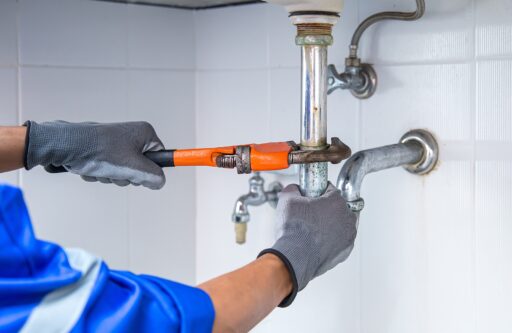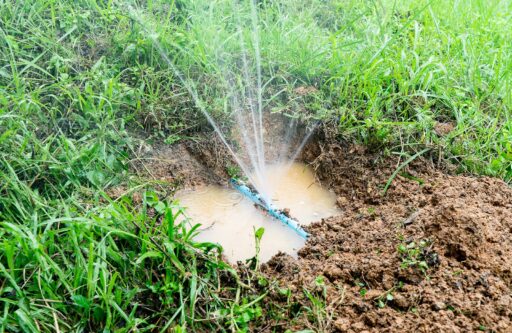Water damage can be one of the most frustrating and costly issues a homeowner faces. In HOA communities, determining responsibility for repairs isn’t always straightforward. Is HOA responsible for water damage? Who handles the damage can depend on several factors.
What are HOA Water Responsibilities?
When water damage strikes, the first thing to determine is where the issue originated. That often dictates whether the HOA or the homeowner is responsible for repairs. HOAs typically maintain common areas and shared structural elements.
These may include roofs, exterior walls, and shared plumbing in condominiums or townhomes. However, the definition of “shared” varies from one community to another, making it essential to consult your governing documents.
HOA water responsibilities usually include the maintenance and repair of pipes and water systems located in common areas or servicing multiple units. For instance, if a leak originates from a pipe that runs behind a shared wall or beneath a building’s slab and impacts multiple units, the HOA is likely on the hook for repairs.
But if the leak is confined to the plumbing inside your walls or under your sink, it’s probably your responsibility.
Is the HOA Responsible for Water Damage?
Well, it depends on two main things: where the water came from and what your governing documents say. Your HOA’s CC&Rs, along with bylaws and maintenance policies, spell out responsibilities in detail.
In many condo associations, for example, HOAs are responsible for damage that occurs to the building’s structure or common elements. That includes roofing failures, exterior pipe bursts, and leaks from walls shared by multiple units.
If water from the roof leaks into your unit due to poor maintenance, the HOA may be required to pay for repairs and even temporary relocation costs, depending on your policy and their negligence.
However, the HOA is typically not responsible for damage caused by something inside your unit, such as a leaking dishwasher or a broken washing machine hose. In those cases, it’s up to the homeowner to repair the damage and cover the costs.
Does HOA Cover Plumbing Issues?

This is one of the most frequently asked questions following a water-related incident. The answer again hinges on location. If the plumbing is part of a shared system—say, a stack that runs through several units in a condo building—it may fall under the HOA’s responsibility.
In contrast, plumbing lines that serve only one unit, particularly those within the walls or under the floor of your individual home, are usually the owner’s concern.
Some HOAs will cover plumbing repairs up to a certain point of demarcation, often where the system enters a private unit. Any plumbing downstream of that point is typically the owner’s job to maintain. It’s crucial to understand where this responsibility line is drawn in your community.
What Repairs are HOA Responsible For?
When it comes to what repairs are HOA responsible for, it’s best to break it down into structural vs. personal property categories. Most HOAs are responsible for:
- Structural components of buildings (roofs, exterior walls, foundations)
- Shared infrastructure (e.g., standard plumbing, electrical lines)
- Exterior features (gutters, siding, stucco)
- Landscaping and irrigation systems
On the flip side, they are not responsible for repairing individual appliances, interior flooring, drywall, cabinetry, or personal belongings inside your home unless the damage resulted directly from a failure in a system the HOA was supposed to maintain.
So, if a roof leak causes water to pour into your condo and damage your hardwood floors and furniture, the HOA may be responsible for fixing the roof and drying out the structure. However, your personal property and interior upgrades are likely your responsibility to replace.
Does HOA Cover Water Leaks?

Water leaks are tricky, especially when it’s not immediately clear where the water is coming from. To determine if your HOA covers the cost, the best approach is to identify the source of the leak first. If the leak is from a roof, a shared pipe, or a faulty gutter system, the HOA is probably responsible for the repair.
But leaks from windows, for instance, are often a grey area. Some HOAs cover window frames but not the glass. Others leave all window repairs to the homeowner. Internal leaks from things like hot water heaters or in-unit plumbing usually fall squarely on the owner’s shoulders.
To avoid confusion, file a report with your HOA as soon as you discover the leak. They’ll likely conduct an inspection to determine fault. Remember that some HOAs also carry master insurance policies, which may cover major structural repairs. However, these often come with high deductibles, and not all forms of water damage are covered.
When Homeowners Insurance Comes into Play
When do homeowners cover water damage? This depends on the type of damage. Most standard homeowners’ insurance policies cover sudden and accidental water damage. This includes burst pipes or overflows, but excludes flooding from outside sources or gradual leaks resulting from poor maintenance.
It’s important to note that even if the HOA is responsible for the damage, your insurance may be your only option for replacing your personal items or making certain repairs quickly. You may need to file a claim through your insurer first and then seek reimbursement through the HOA if they’re deemed at fault.
Homeowners in HOA communities should consider buying condo or HO-6 insurance policies that complement the association’s master policy. These policies typically cover items like interior walls, flooring, and contents that are not protected by the HOA’s policy.
Steps to Take When Water Damage Occurs
If water damage hits your home, take these actions right away:
- Stop the water source, if possible—turn off valves or shut off the water main.
- Document the damage with photos or videos before you start the cleanup.
- Contact the HOA to report the incident, especially if the source isn’t immediately apparent.
- Review your insurance policy and contact your provider to file a claim.
- Review your governing documents to determine your responsibilities and coverage limitations.
Don’t wait for the HOA to act if you know the damage could worsen. Start mitigation quickly to prevent mold, structural damage, and escalating repair costs.
Preventing Future Water Disputes

One of the most effective ways to avoid conflict is through proactive measures and clear communication.
Homeowners should routinely inspect appliances, shutoff valves, and interior plumbing. HOAs should conduct regular maintenance on common areas, roofs, and irrigation systems to ensure their optimal functioning. Both parties benefit when water systems are well-maintained and responsibilities are clearly outlined.
It’s also wise for HOAs to communicate their responsibilities to residents. Updating CC&Rs to reflect modern materials and community layouts, especially after renovations or infrastructure changes, helps avoid disputes later.
When the Water is Clear
Water damage can cause chaos, but with the proper knowledge and swift action, you can minimize the stress and associated costs. Knowing your responsibilities and coverage options can make all the difference.
Freedom Community Management provides HOA management services in Florida. Call us at 904-490-8191 or contact us online to learn more!


